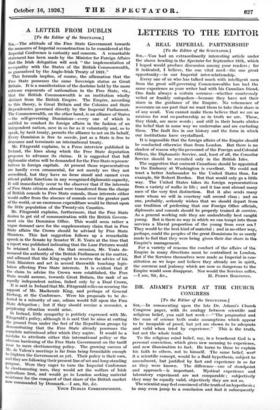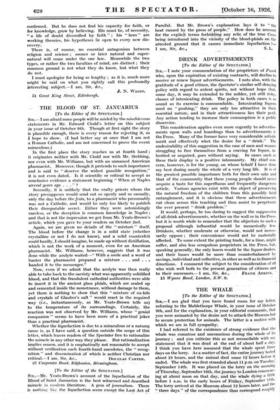DR. ADAMI'S PAPER AT THE CHURCH, CONGRESS
[To the Editor of the SPEcrAron.] Sra,—In commenting upon the late Dr. Adami's Church Congress paper, with its analogy between scientific and religious belief, you said last week :—" The pragmatist and the man of science both make assumptions which appear to be incapable of proof, but yet are shown to be adequate and valid when tried by experience." This is the truth, but not the whole truth.
To the religious mind belief, say, in a beneficent God is a personal conviction, which gives new meaning to experience, and new illumination to fact. He turns to these to explain his faith to others, not to himself. The same belief, were it a scientific concept, would be a fluid hypothesis, subject to amendment, but justified by fact and experience in so far as they were known. The difference—one of standpoint and approach—is important. Mystical experience and laboratory experiment are not comparable ; subjectively they may be equally valid, objectively they are not so.
The scientist may feel convinced of the truth of an hypothesis ; he may even jump to a conclusion and find it subsequently confirmed. But he does not find his capacity for faith, or for knowledge, grow by believing. His must be, of necessity, " a life of doubt diversified by faith " ; his " laws " are working theories, his hypotheses lie open to every new dis- covery.
There is, of course, no essential antagonism between religion and science ; sooner or later natural and super- natural will come under the one law. Meanwhile the two types, or rather the two faculties of mind, are distinct ; their common ground is not what they do know, but what they do not.
I must apologise for being so lengthy ; as it is, much more might be said on what you rightly call this profoundly interesting subject. —I am, Sir, &c.,
J. N. WALES. 51 Great King Street, Edinburgh.























































 Previous page
Previous page